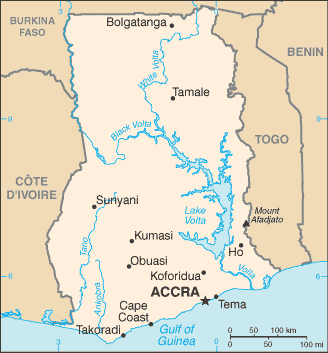African Faith Tabernacle Church
| African Faith Tabernacle Church | |
|---|---|
 Tanzania: World Factbook, 2009[1] | |
|
Location |
|
|
Contact information |
|
|
Date established |
|
|
Presiding officer |
|
|
MWC Affiliated? |
|
|
Number of Congregations |
|
|
Membership |
|
African Faith Tabernacle Church is a church in Ghana affiliated with the African Instituted (Independent) Churches.
Create new articles that tell stories about the Anabaptists of African Faith Tabernacle Church and insert links to those stories here. Click here to learn more about stories.
Origins
The founder of the African Faith Tabernacle Church is Prophet James Kwame Nkansah. Even though he had no access to formal education, he managed to highly educate himself. As a result of his efforts and openness to learning all that he could about the world, he was very responsive to the call of God on his life.
God’s call inspired him to actively evangelize in rural towns and villages in the regions along the Ghana’s Atlantic coast, molding his gifts and sharpening his skills for ministry. This experience in evangelism work, and the encouragement of others enabled him to enter into the area of church planting.
Nkansah’s autocratic style of leadership fit into the indigenous culture of his people. He also welcomed the indigenous practices of drumming and dancing and the use of Ghanaian languages (rather than colonial languages) in his church. This gave him great success in the ministry because the way of worship in African Faith Tabernacle church met the needs of his church members.
Worship style
The use of particular call-and-response style indigenous music is a gift that this church brings to the rest of the worldwide Christian faith community. Because it draws on deeply-felt rhythms, sounds, and group interaction, it can really energize a congregation for prayer and spiritual warfare (times when people feel the need to rebuke demons in Jesus’ name and intercede on behalf of others and deliver them from painful situations). If one congregation is energized for Jesus, then the enthusiasm just spreads to other congregations in the area, and to society at large.
The style is called Abibi Ndwom in the local dialect. It is sung, with local drums and horns to harmonize to the tune. In Abibi Ndwom, the leader raises the song, line by line, and the congregation responds. The Abibi Ndwom predates the Congo (more popularly know as the Three-Time-Beat) style which is predominate in Highlife secular music and Christianized Highlife music. (Congo, though a borrowed rhythm set, has now become significantly integrated into Ghanaian worship style and life).
In addition to the use of indigenous music styles, the use of indigenous languages for church ritual and liturgy creates an atmosphere of freedom for all to participate. The use of local languages—although it may not be beneficial to foreigners—helps the congregation to freely express themselves in their mother tongue, in worship. Sometimes, the use of a colonial or foreign language in churches hinders those who cannot freely express themselves in it. They may withdraw to the corners and shadows of the church, or they may simply join other churches where they are given the opportunity to worship in their own languages.
Electronic Resources
Annotated Bibliography
Citations
- ↑ "Ghana," CIA World Factbook. https://www.cia.gov/library/publications/the-world-factbook/graphics/maps/small/gh-map.gif (accessed 20 September 2009).
Acknowledgements
Edgar Nashief compiled and wrote much of the information presented here.